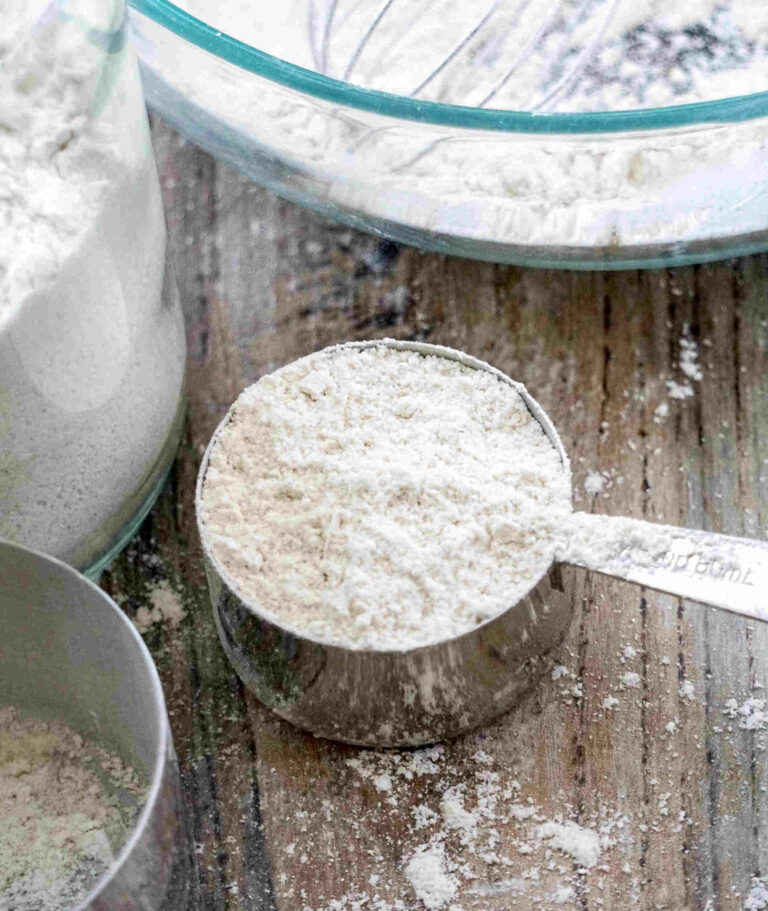Make Ginger Water The Right Way: Benefits And Drinking Tips
Over recent years, the wellness community has been abuzz with the many potential benefits of drinking ginger water. This simple health beverage, ranging from the traditional “ginger hot water” preparation to more modern “ginger infused water” variations, promises not only flavor but also a myriad of health perks.
But how exactly do you make ginger water to ensure you’re getting the most out of it? Is it better served as “warm ginger water” or taken cold? And importantly, how much ginger is too much? This comprehensive guide will be answer these questions and provide an easy-to-follow ginger water recipe.

If you enjoy sipping on infused waters throughout the day, mix up a refreshing Cucumber Lemon Ginger Water as an alternative.
Why the Buzz about Ginger Water
Ginger water, a simple infusion of ginger’s spicy zest into pure water, is more than just a refreshing drink. It’s a centuries-old remedy, packed with bioactive components that modern science is only beginning to understand.

Related: Anti-inflammatory Juice Recipe for Whole Body Health
Ginger, the rhizome of the Zingiber officinale plant, has been used for centuries in traditional medicine. When infused in water, it offers a refreshing and therapeutic drink.
As today’s society gravitates towards natural health solutions, this ginger water infusion emerges as a top choice. With its powerful health benefits, from aiding digestion to curbing inflammation, ginger water seamlessly introduces this superfood’s goodness into our daily regimen.
What are the Proven Benefits of Drinking Ginger Water
- Digestive Health: Ginger can help alleviate gastrointestinal irritation, stimulate saliva, and suppress gastric contractions as food and fluids move through the GI tract.
- Anti-inflammatory: Ginger contains anti-inflammatory properties that can help with pain and inflammation.
- Antioxidant-rich: It combats oxidative stress, preventing cellular damage.
- Boosting Immunity: Ginger is known to enhance the immune response by stimulating white blood cells.
- Anti-diabetic: Some studies have found that ginger may help with diabetes management by improving insulin sensitivity and preventing prediabetes.
Related: Immune Booster Juice With Carrot Orange Ginger
Related: The Best Natural Colon Cleanse And Liver Detox Smoothie
Ginger Water Recipe Ingredients
- Fresh ginger root (2 inches). Typically when translated to:
- Slices: About 6 to 8 thin slices, depending on how thick you slice them.
- Minced: Roughly 2 tablespoons when finely minced.
- Weight: Approximately 0.5 ounces or 14 grams.
- 1 liter of water (4.2 cups);

Steps To Make Ginger Water
- Clean the ginger root thoroughly. Peel ginger for cleaner taste and safety if non-organic; keep unpeeled for full flavor and nutrients with organic, well-washed ginger roots.
- If using fresh ginger, slice it thinly. For dried, measure out the required amount.
- TIP: The thinner the slices or the more crushed the ginger is, the more pungent the flavor of the water will be. Adjust the amount and the way you cut the ginger according to your taste preferences and the intensity you desire.
- Boil the water. Add the water to the ginger. Let it steep for 15 minutes.

- Or second method: Once the water reaches a boil, add the ginger slices and then turn down the heat, letting the mixture simmer for about 10-15 minutes. This is shorter than prolonged boiling and should be sufficient to extract a good amount of the compounds without excessive heat degradation. By not boiling for too long, this method strikes a balance between extracting a robust flavor and ensuring a good concentration of ginger’s beneficial compounds.

- Let it cool. Your ginger water is ready!
Related: 4 Anti-Inflammatory Green Smoothie Recipes

Hot Ginger vs. Cold Ginger: Which is Better?
While warm ginger water can be soothing and aid in digestion, cold ginger infused water retains many of the plant’s natural benefits. Both are effective, but for a more immediate soothing effect, especially for digestion, hot ginger is preferred. Here is a comparative breakdown of ways ginger water is prepared:
Steeping with Boiling Water
- Retains more volatile compounds due to less exposure to heat.
- Produces a milder flavor.
- Quick and convenient method.
- Gingerol, the main bioactive compound in ginger, remains largely intact.
Boiling Ginger
- Can enhance the strength of the flavor.
- May reduce some heat-sensitive nutrients due to prolonged exposure to high temperatures.
- Transforms gingerol into shogaol, which may have even more potent health benefits.
- Suitable for those preferring a stronger-tasting beverage.
Cold Water Infusion
- Preserves all heat-sensitive compounds since there is no heat involved.
- Results in a much milder flavor; requires a longer infusion time (often several hours to overnight).
- The least effective method for extracting ginger’s bioactive compounds quickly.
In summary, steeping with boiling water is a balance between flavor and preserving nutrients, boiling can enhance flavor and transform compounds but may reduce some nutrients, and cold water infusion preserves all nutrients but extracts them more slowly and provides a milder flavor. Your choice depends on personal preference for flavor intensity and the specific health benefits you are looking to obtain from ginger water.
Ways to Consume
Drink it hot as a soothing tea or cold for a refreshing drink. You can also use it as a base for smoothies or cocktails. You can also add some lemon slices and sweeten with honey if prefered.
For a soothing touch to your cold and flu remedies, try adding ginger water to your herbal teas or “flu bomb” drinks to help speed up recovery. And for a strong immune system boost, consider making a concentrated Immune Boosting Tonic with ginger, lemon honey and garlic.

Fresh Ginger or Dried: Which to Choose?
Fresh ginger retains more of its natural enzymes and beneficial compounds compared to its dried counterpart. However, dried ginger is more concentrated and can be used in smaller quantities.
How Much Ginger is Too Much?
While ginger offers numerous health benefits, moderation is key. Consuming more than 5 grams of ginger per day may lead to heartburn, stomach discomfort, or diarrhea in some individuals.
Tips for the Best Ginger Infused Water
- Opt for organic ginger to avoid pesticides.
- Combine ginger with other beneficial ingredients like lemon or mint for added flavor and benefits.
- Allow the water to steep for longer if you prefer a stronger flavor.
Storing Your Ginger Water
Ginger water can be stored in the refrigerator for up to 3-4 days if boiled. If fresh and cold- store in the refrigerator for up to 24 hours. Make sure to keep it in a sealed jar or bottle. For extended freshness, consider making ginger ice cubes.

FAQ on Ginger Water
The best time to drink ginger water depends on your personal health goals:
For Digestion: Have it before or with meals to help stimulate digestion.
For Nausea: Drink it in the morning or when feeling nauseous.
For Weight Loss: Consume it before meals to potentially help increase feelings of fullness.
For Overall Benefits: Sip it throughout the day or when you need a refreshing boost.
For ginger water, use about one to two inches of fresh ginger root per four cups of water, adjusting to taste. Start with less if you’re new to it or have a sensitive stomach.
Moderation is key. Usually, one to two glasses of ginger water a day are sufficient to enjoy its benefits without overdoing it. Listen to your body and adjust accordingly.
Absolutely! Ginger pairs well with many herbs and fruits.
Ginger water can boost metabolism, but it’s essential to maintain a balanced diet and regular exercise.
Ginger water is generally safe, but excessive consumption could lead to heartburn, gas, or upset stomach. Again, listen to your body and adjust accordingly.
Ginger can interact with certain medications, such as blood thinners. It’s important to talk to a healthcare provider if you have concerns about interactions.
Give the ginger water a try and experience its myriad benefits. Remember, the best results come from consistency and moderation. Happy sipping!
Related: Best Diet & Foods For Healing At Cellular Level (+PDF List)
Need More Healthy Drinks?
Related: Hidden Body & Mind Signals Your Detox Pathways Are Struggling
Ginger Infused Water Recipe
Ingredients
- 2 inches fresh ginger root - Typically 6 to 8 thin slices, roughly 2 tablespoons or 0.5 ounces or 14 g.
- 1 liter of water - ~ 4.2 cups
Optional Add-ins:
- 1 slices lemon
- 1 tsp honey
Instructions
- Clean the ginger root thoroughly. Peel ginger for cleaner taste and safety if non-organic; keep unpeeled for full flavor and nutrients with organic, well-washed ginger roots. Slice it thinly or mince it.
- TIP: The thinner the slices or the more crushed the ginger is, the more pungent the flavor of the water will be. Adjust the amount and the way you cut the ginger according to your taste preferences and the intensity you desire.
- Boil the water.
- Add the water to the ginger. Let it steep for 15 minutes.
Or second method:
- Once the water reaches a boil, add the ginger slices and then turn down the heat, letting the mixture simmer for about 10-15 minutes. This is shorter than prolonged boiling and should be sufficient to extract a good amount of the compounds without excessive heat degradation. This method strikes a balance between extracting a robust flavor and ensuring a good concentration of ginger’s beneficial compounds.
- Let it cool. Your ginger water is ready!
Notes
Steeping with Hot Water
- Retains more volatile compounds due to less exposure to heat.
- Produces a milder flavor.
- Quick and convenient method.
- Gingerol, the main bioactive compound in ginger, remains largely intact.
Cold Water Infusion
- Preserves all heat-sensitive compounds since there is no heat involved.
- Results in a much milder flavor; requires a longer infusion time (often several hours to overnight).
- The least effective method for extracting ginger’s bioactive compounds quickly.
Storing Your Ginger Water
Ginger water can be stored in the refrigerator for up to 3-4 days if boiled. If fresh and cold- store in the refrigerator for up to 24 hours. Make sure to keep it in a sealed jar or bottle. For extended freshness, consider making ginger ice cubes.Nutrition
The information shown is an estimate provided by an online nutrition calculator.
©HealthyTasteOfLife. Content and photographs are copyright protected and need prior permission to use. Copying and/or pasting full recipes to other websites and any social media is strictly prohibited. Sharing and using the link of this recipe is both encouraged and appreciated!

















Your blog is a valuable asset to the community.
Thank you for this information!
I love how this blog promotes a healthy and balanced lifestyle It’s a great reminder to take care of our bodies and minds